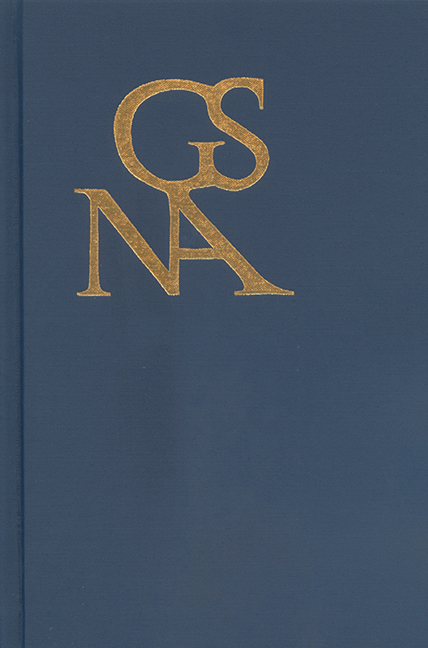Book contents
- Frontmatter
- Contents
- Special Section on Goethe and the Postclassical: Literature, Science, Art, and Philosophy, 1805–1815
- Helena, Then Hell: Faust as Review and Anticipation of Modern Times
- Histrionic Nationality: Implications of the Verse in Faust
- Die Wette in Goethes Faust
- Ecocriticism, the Elements, and the Ascent/Descent into Weather in Goethe's Faust
- Grablegung im Vorhof des Palasts: Groteske Anschaulichkeit in den vorletzten Szenen von Faust II
- Goethes Gnostiker: Fausts vergessener Nihilismus und sein Streben nach Erlösungswissen
- The Unconscious of Nature: Analyzing Disenchantment in Faust I
- Forms of Figuration in Goethe's Faust
- Goethe's Morphology of Knowledge, or the Overgrowth of Nomenclature
- Paraphrasis: Goethe, the Novella, and Forms of Translational Knowledge
- Dramas of Knowledge: The “Fortunate Event” of Recognition
- gegen: Bewegungen durch Goethes “Der Mann von funfzig Jahren”
- “Offenbares Geheimnis” oder “geheime Offenbarung”? Goethes Märchen und die Apokalypse
- Goethe's Green: The “Mixed” Boundary Colors in Zur Farbenlehre
- For Heaven's Sake, I Will Have You Walk into the Dark: Grillparzer's Containment of Beethoven and the Ambivalence of Their Melusina Project
- Imitation, Pleasure, and Aesthetic Education in the Poetics and Comedies of Johann Elias Schlegel
- Feindlich verbündet: Lessing und die Neuen Erweiterungen der Erkenntnis und des Vergnügens
- Juvenalian Satire and the Divided Self in Goethe's “Das Tagebuch”
- Book Reviews
Paraphrasis: Goethe, the Novella, and Forms of Translational Knowledge
from Special Section on Goethe and the Postclassical: Literature, Science, Art, and Philosophy, 1805–1815
Published online by Cambridge University Press: 14 March 2018
- Frontmatter
- Contents
- Special Section on Goethe and the Postclassical: Literature, Science, Art, and Philosophy, 1805–1815
- Helena, Then Hell: Faust as Review and Anticipation of Modern Times
- Histrionic Nationality: Implications of the Verse in Faust
- Die Wette in Goethes Faust
- Ecocriticism, the Elements, and the Ascent/Descent into Weather in Goethe's Faust
- Grablegung im Vorhof des Palasts: Groteske Anschaulichkeit in den vorletzten Szenen von Faust II
- Goethes Gnostiker: Fausts vergessener Nihilismus und sein Streben nach Erlösungswissen
- The Unconscious of Nature: Analyzing Disenchantment in Faust I
- Forms of Figuration in Goethe's Faust
- Goethe's Morphology of Knowledge, or the Overgrowth of Nomenclature
- Paraphrasis: Goethe, the Novella, and Forms of Translational Knowledge
- Dramas of Knowledge: The “Fortunate Event” of Recognition
- gegen: Bewegungen durch Goethes “Der Mann von funfzig Jahren”
- “Offenbares Geheimnis” oder “geheime Offenbarung”? Goethes Märchen und die Apokalypse
- Goethe's Green: The “Mixed” Boundary Colors in Zur Farbenlehre
- For Heaven's Sake, I Will Have You Walk into the Dark: Grillparzer's Containment of Beethoven and the Ambivalence of Their Melusina Project
- Imitation, Pleasure, and Aesthetic Education in the Poetics and Comedies of Johann Elias Schlegel
- Feindlich verbündet: Lessing und die Neuen Erweiterungen der Erkenntnis und des Vergnügens
- Juvenalian Satire and the Divided Self in Goethe's “Das Tagebuch”
- Book Reviews
Summary
I hate quotation.
—Ralph Waldo EmersonIF THERE IS ONE ORTHODOXY LEFT in today's ecumenical critical environment it is surely the heresy of paraphrase. No amount of methodological turns, it seems, have been able to leave behind the ghost of Cleanth Brooks. “Most of our difficulties in criticism are rooted in the heresy of paraphrase,” he patiently warned us in his literary-papal bull of 1947. “If we allow ourselves to be misled by it, we distort the relation of the poem to its “truth,” we raise the problem of belief in a vicious and crippling form, we split the poem between its ‘form’ and ‘content.’ … To refer the structure of the poem to what is finally a paraphrase of the poem is to refer it to something outside the poem.” After Brooks who would disagree that the meaning of a poem cannot be reduced to what he called the poem's “prose-sense,” to something unconnected to the poem's form? Who among us today would dare practice or teach paraphrase?
Brooks’ exile of paraphrase from the pantheon of critical practice at the end of the Second World War was offered as a solution to a perceived crisis in the humanities, a crisis of course that strikes us as deeply familiar today. And yet to one of Brooks’ humanist predecessors, such as Erasmus of Rotterdam, the denunciation of paraphrase would have seemed a distinctly odd choice as a means of critical renewal. At work during another moment of a profound sense of crisis in the humanities that accompanied great geo-political struggle, paraphrase was seen by Erasmus as the solution to this crisis, not its source. Writing to his fellow humanist, Johann Henckel, in response to an inquiry about his new project of biblical paraphrases, Erasmus noted the “general neglect of languages and the humanities,” and continued: “The ancient writers lie neglected. Scholastic philosophy, which I wished to see reformed, not eliminated, is in decline. Almost all liberal studies are dying.” The cause of this rising neglect was, according to Erasmus, methodological conflict. As he wrote in the preface to his Paraphrase on Acts, comparing warring humanists to Europe's belligerent kings, “These chaotic enmities between one monarch and another, so fraught with disaster, so implacable, so long-continued, so far beyond all cure—are they not like some desperate sickness of the whole body?
- Type
- Chapter
- Information
- Goethe Yearbook 17 , pp. 179 - 202Publisher: Boydell & BrewerPrint publication year: 2010



